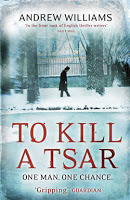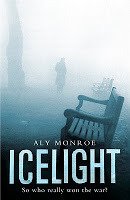The Role of History in the Making of Stories


Over on Goodreads, Andrew Williams and I chat about The Role of History in the Making of Stories - and other things - and we will be available to chat and answer questions for the next few weeks. For those of you who are not on Goodreads, here is our chat. We'd love to hear your comments and answer any of your questions, so you can either do that by commenting here on this blog, or, if you are a member, join the group on Goodreads.
Andrew's book The Poison Tide will be published in 2012. To Kill A Tsar is published in paperback on September 29th 2011.
My latest book, Icelight, the third in the Peter Cotton series, is published on October 13th 2011. Black Bear will be published late in 2012.
Here is our chat:
Novelists Aly Monroe, author of The Maze of Cadiz, Washington Shadow and Icelight, and Andrew Williams, author of The Interrogator and To Kill a Tsar, chat about the role of history in the making of their stories. Both were shortlisted for the 2010 CWA Ellis Peters Historical Fiction Award
Aly: You told me your parents were history teachers. How much was history a part of your childhood, and how much does it give you your ideas?
Andrew: Lots and lots. I've always been fascinated by the past. Yes, my parents were history teachers and I think I could name the buildings of a medieval monastery by the time I was ten.
Aly: A bit of a history geek from an early age then?
Andrew: I did like football too. But all my stories draw on real people and events. Sometimes I change names, sometimes I don't. Of course, I'm telling a story so I tinker with the facts, but I hate making mistakes with the history. I mean, I'm happy to repaint people and events just as long as I know why I'm doing it. If I am economical with the actualité you'll find the reason in the historical note at the back of the book. I feel a responsibility to the history, and so do the writers I admire most. It's a shocking cliché, I know, but truth is often – I would say 'usually' – stranger and more compelling that pure fiction, at least as a big backdrop.
By the way, I'm not sure I think of myself as a historical novelist, just a thriller writer who sets his stories in the recent past.
Aly: My case is a little different. My parents weren't history teachers (though my father started out as a university teacher), but my grandparents on both sides were immigrants, and I think this may have influenced me in a number of ways – not only my interest in the recent past but also in half belonging to other places.
My books are set just within living memory. So the history part of what I write often begins with things I have heard directly from people who had experience of the time and events I'm writing about. This provides a springboard for research. This was the case with The Maze of Cadiz, when people in Spain talked to me of their experiences under the Franco regime. It was also the case for the initial idea of the Peter Cotton series - and the character of Peter Cotton himself.
Andrew: So what especially attracts you about the past rather than the present day for your stories?
Aly: I'm interested in how people are moulded by the particular time and place that they inhabit, and how they react to it. Readers have their own backgrounds and have lived, or more likely know people who have lived, through the time described. It's more Grandpa than Cleopatra's handmaiden because I like that living link. Asps are fine, but women using pencils to draw a false stocking seam on their wartime legs is also interesting, as is the knicker elastic problem post war.
What about you?
Andrew: I am interested in ordinary people's lives in extraordinary times; in wars, periods of political upheaval or revolution, above all in conflict.
I have only a passing academic interest in the swords and sandals history of the distant past. I understand my characters because the world they inhabit isn't so very different from mine. I can imagine my Great-Great Grandfather Jesse Williams following events in Russia in his newspaper. He might have read the reports of The Times' correspondent in Petersburg, George Dobson. Well, when I was researching To Kill, I read Dobson's dispatches too. All the sources necessary to flesh out the bones of the history are there. I have the context for the love, friendship, hope, despair, betrayal and grief that are common to all lives, and those are the things that interest me most. The recent past of my stories doesn't seem such a foreign country. Not so foreign I can't ask of myself and the reader: what would you do if y



